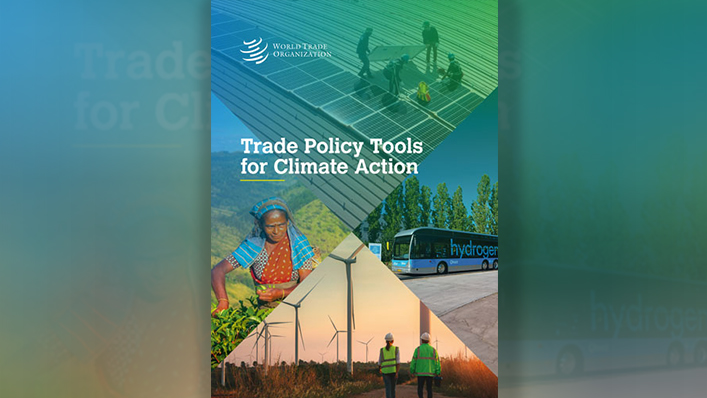
“The United Nations’ authoritative ‘global stocktake’ ahead of COP28 demonstrates that national pledges to cut global greenhouse gas emissions remain well short of what is required to avoid the worst effects of climate change in line with the 2015 Paris Agreement,” Director-General Ngozi Okonjo-Iweala says in her foreword to the report. “In this publication, the WTO Secretariat explores 10 trade policy tools that can accelerate progress towards climate goals. Each element could be integrated into nationally determined contributions (NDCs) and national adaptation plans (NAPs) as economies look to ratchet up the ambition of their climate strategies.”
“The toolkit builds on the Secretariat’s research work to shed light on ways that trade and trade policy can help accelerate and amplify the impacts of climate action for the benefit of current and future generations,” DG Okonjo-Iweala says. “The lesson is clear: without globally integrated supply chains, getting to net-zero emissions by mid-century would become much more expensive.”
The toolkit, prepared by the WTO Secretariat as a source of information and possible inspiration to policymakers, spotlights 10 trade policy actions based on the Secretariat’s research and on what many WTO members are already doing.
The options include: 1) introducing trade facilitation measures to reduce greenhouse gas emissions associated with cumbersome border customs procedures; 2) deploying green government procurement policies; 3) using international standards to avoid fragmentation when upgrading energy efficiency regulations; 4) reviewing regulations and restrictions on providers of climate-related services to support climate mitigation and adaptation efforts; 5) rebalancing import tariffs to increase the uptake of low-carbon technologies; 6) reforming environmentally harmful subsidies to unlock additional resources for climate action; 7) facilitating and increasing trade finance to support the diffusion of climate-related technologies and equipment; 8) improving how food and agricultural markets function to support climate adaptation and mitigation by easing trade in food; 9) strengthening sanitary and phytosanitary systems to protect economies from the spread of disease, pests and other related risks heightened by climate change; and 10) improving the coordination of climate-related internal taxes, including carbon pricing and equivalent policies, to reduce policy fragmentation and compliance costs.
On the issue of import tariffs, the publication notes that crude oil and coal face average tariffs of 0.8% and 1.6% respectively while renewable energy equipment faces average tariffs of 3.2%, with some economies applying tariffs as high as 12%. Import tariffs could be reviewed with a view to promoting the affordability and uptake of green energy, it states. At least 30 WTO members from all regions and levels of economic development, furthermore, have already used tariff reductions for environmental purposes, mostly for renewable technologies and low-carbon and electric vehicles.
On government procurement, the publication further notes that governments spend around US $13 trillion in public procurement per year, and this is directly and indirectly responsible for 15% of green house gas emissions. Introducing climate-sensitive criteria, while keeping public markets open for efficient and sustainable suppliers, could significantly reduce emissions according to the publication. The WTO’s Environmental Database reveals that members have notified to the WTO over 70 environment-related government procurement measures since 2009.
The full publication is available here.
Share
Reach us to explore global export and import deals